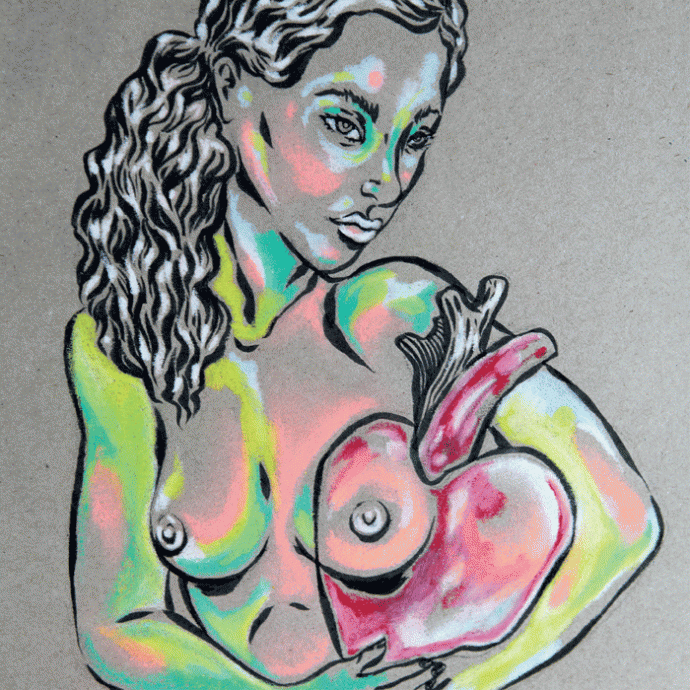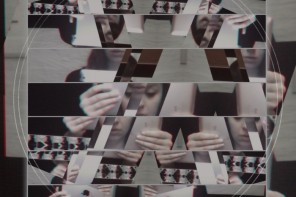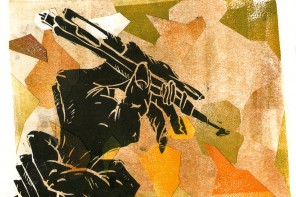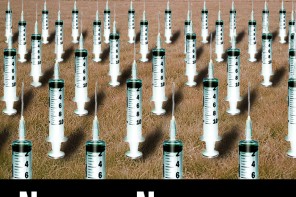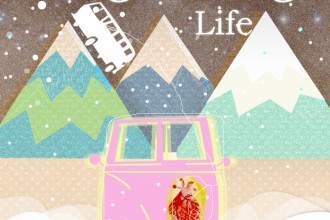On December 20, 1989, American troops invaded the small Central American country of Panama. The U.S. military, with the help of an AH-36 Apache helicopter that raked both country’s military basis and working class communities, overwhelmed the Panama Defense Force within days. Panamanians estimate that between 2000 and 6000 people were killed in this assault. The main reason for the invasion, according to U.S. president at the time, George Bush, Sr., was “to remove an evil dictator, Noriega.” Later on, the reasoning was updated with “to protect American lives.”
What the official reports on the invasion left out were the horrible effects international politics can have on small people’s lives. Sensa Nostra talks with a proud Panamanian woman who experienced U.S. invasion as an 11 year old girl. She shares with us how this event has forever changed her life.
The Americans invaded Panama five days before Christmas in 1989, when I was an eleven year old girl, living every child’s dream. My father was the head editor of one of the most important journals in Panama, a high position that ensured him and his family an equally high income. He was well educated and very opinionated. He studied in Russia and travelled a lot. My mother was the queen of the house, whose only job was raising my brother and me. My brother and I were carefree: we were attending a good school, we were dressed in the clothes we wanted to be dressed in, and we had our favourite cereal served for breakfast every day. In my eyes, we were wealthy and happy, a picture-perfect family.
Then, in one day, my whole life changed. The day started as any other – I got up, got dressed and headed for school. But my mother stopped me. She told me that I would not go to school that day, because Americans have invaded Panama. It was my first encounter with this word, ‘invasion’, and I had no idea what it meant. I had no idea that the life I lived was going to change forever and that there was no turning back. I was a child, unable to comprehend what was going on even when it had already started to affect me directly. My father, an opinionated and respectable Panamanian communist, was one of the first to leave the country. The day before he got exiled to Cuba, I got one hour with him to say goodbye. I went there, he introduced me to Noriega’s wife who was there with him and we chitchatted a bit. It was a conversation like any other we’ve had: I went there to say “Hi,” not “Goodbye.”
But my father was gone, and so was my comfort. My mother started to sell all of our possessions to get enough money to leave the country. We went to South America, where my mother’s family lived, hoping to find refuge there. However, according to her family, my mother was unworthy of their help, since she made this terrible mistake of marrying a Panamanian. Her family is deeply religious and of very traditional values. My father is an atheist, a communist and a man of colour – all they hate rolled into one. They never forgave her and we never found any help there. Once again, we were left on our own. Moving a lot, eating mostly in public diners, dressed only in second-hand clothes, we were living a completely different life than that we were used to.
My mother has always had a comfortable life. She didn’t have to work to survive. She took food and shelter for granted. Then all of a sudden, she was the one who was responsible for both of ours survival and she felt the world’s burden on her shoulders for the first time in her life. Maybe that’s why she soon assumed her family’s portrayal of my father. Soon, he became “Panamanian piece of shit who abandoned us and got us into all of this trouble.” As his daughter and as a Panamanian, I felt she was indirectly insulting me as well. I felt that I had become a burden for her. My existence was only troubling her more. That was when I started to resent food. When I stopped eating, I was too young to comprehend the severity of my actions or the cause of them. I only learned I am anorexic when I spotted the word in a book I borrowed from the man we lived with for a short while in Ecuador. To this day, I’m still not sure if the main reason for my eating problems was to help my mother save money or simply to die.
I believed everything would sort itself out when we returned back home to Panama. When I was about 14, we finally had enough finances to go back. Only it wasn’t our home anymore. Being poor, I attended a different school and lived in a different part of the city than I used to. My friends, on the other hand, were still the same posh kids I once was like, and they didn’t think the poor version of me fis into their cool group anymore. They were typical teenagers – their thoughts were occupied with fashion, partying and dating, and their normality couldn’t be farther away from my own. Only upon my return to Panama did I realize that I wasn’t only temporarily away from my heaven all this time. My home, as my previous life, did not exist anymore.
There in Panama, three years after America invaded, I finally realized: my dad is not coming back, this is my new life now. I realized that I had to take care of myself and, feeling old enough, I started to work for a journal. When I received my first 50 dollars, I felt like a millionaire. Millionaire with one zero. But still, for a second, I felt rich. I could once again afford to buy things that I once took for granted. I still remember buying myself my favorite cereal with this money, the apple-cinnamon ones my dad used to buy for me. Only this time, I did all the work by myself.
I was nineteen when I saw my father again. One day, I heard a knock on my door and a familiar voice saying, “Hola, hija.” I thought I saw a ghost. It’d been eight years without hearing from him, and I didn’t even know if he was alive. But seeing him again, even after all this time, he seemed just like the lovely dad I used to know. I ignored the little voice in my head (who sounded a lot like the voice of my mother) that was telling me that this person had abandoned me. I hugged him and held him and cried with him. I had my father back. Or that’s what I thought. In an hour, he left.
I was disappointed and devastated and confused. Why would he come back only to leave me alone again? But then, little by little, I started to understand. In those eight years everything had changed not only in my life, but also in his. I needed to step into his shoes to understand his actions, to understand why he is as important as he is. I know now that even though he is my father, he is so much more than that. He is a person with his own life, his own beliefs that he has to follow, and goals that he wants to achieve. He is, just like my mother and my brother are, a person with his own traumas and his own ways of dealing with them. Even if they are my family, I see them first and foremost as human beings – just as damaged by this experience as I was. How can I expect them, already occupied with solving their own problems, to also solve mine?
Only now, so many years later, can I say I’ve gained a perspective about what was going on when my family got forcibly broken apart by the invasion. It took me years, but now I understand why things played out the way they did, and why my family members reacted the way they did. I understand why my mother blamed my father for everything, I understand why my brother has distanced himself from me, and why my father thought helping others was always more important than helping me, his daughter. The reason is the same one that has ignited my twelve years of anorexia. Everything ended in a brutal dismantling of my family, in 1989. Each of us has developed their own traumas and their own ways of dealing with the tragedy we went through when our lives and our safety got assaulted.
Right now, I am on my healing journey, that’s what I call it. I’m travelling to heal my traumas. The process started over ten years ago, but I believe I have made the biggest progress over the last few months. In April, I came to Europe to see my boyfriend but we split a week after. Refusing to stay in France to cry, I packed my bags and came to Berlin, a city I knew my father had been to when he was younger.
My father and I have a somewhat strange way of communicating. We talk, but not often and not much. Our communication over email is telegraph-like: the words are few and carefully selected, as if space taken or time needed to write was an issue. But it was neither space nor time that limited our communication; now I know it was the lack of common ground we could discuss. Since I came to Europe, however, my father has taken greatest interest in what I do. His emails are no longer only one line long, but rather two lines. The longer I stay here, the longer the emails get. Last month, when I went to Croatia, another place I know is dear to him, he wrote me a one-page long email. I received one whole page of him – his experience in Croatia, his deepest secrets and his fears. I feel closer to him now that I’ve felt in a long time and, in a strange and twisted way, I feel like I have my father back again. Now, we finally have something to talk about.
When I packed my bags in Panama almost a year ago, I came here with the intention to sort out my life. At last, I did it: not in a way that I planned to, but yet in a way that turned out to be much more meaningful and beneficial that I ever expected. Walking the traces of my father’s past, I have managed to reconnect with my brother, I have better communication with my mother, and I have developed a closer relationship with my father.
I intend to close this whole ‘invasion traumas’ chapter of my life next month. It’s been a long time that I’ve been travelling only to heal my traumas and not for vacation, as normal people do. It is time to close this story and start making new ones. I’ve decided it must come to an end, and with that purpose in mind, I will go to another place I know my father loves. I’m going to Vietnam at the end of the month with one single purpose in mind: to take a photo at the exact same spot my father once took a photo of himself. I will take a photo, have a final cry and take the last look at the past. There, I’ll finally heal the wound that was opened in 1989, when my family got broken apart by the invasion. I’ll get a closure of this chapter that has occupied my thoughts for way too long and has directed my actions for most of my life. I do already feel that I have a family once again. But I will end my healing journey then and there: at the spot my father and I will share forever.

